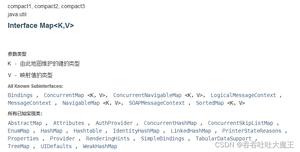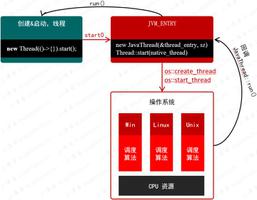15道非常经典的Java面试题 附详细答案
试题如下:




参考答案:
import java.io.FileNotFoundException;
import java.io.IOException;
import java.util.ArrayList;
import java.util.concurrent.ExecutorService;
import java.util.concurrent.Executors;
/**
* Created by ysc on 7/26/16.
*/
public class Interview {
private static void one(){
String str1 = "hello";
String str2 = "he"+new String("llo");
System.err.println(str1==str2);
System.out.println("1. false");
}
private static void two(){
int i = Integer.MAX_VALUE;
System.err.println((i+1)<i);
System.out.println("2. 存在一个i, 使得(i+1)<i");
}
private static void three(){
System.err.println("gc is not a Java Thread, it is a native thread");
Thread.getAllStackTraces().keySet().forEach(thread -> System.out.println(thread.getName()+"->"+thread.isDaemon()+" "+thread.getPriority()));
System.out.println("3. gc线程是daemon线程");
}
private static volatile int count = 0;
private static void four(){
ExecutorService executorService = Executors.newCachedThreadPool();
for(int j=0; j<10; j++){
executorService.submit(()->{
for(int i=0; i<1000000; i++){
count++;
}
});
}
System.out.println("count should be: "+10000000+", actual be: "+count);
System.out.println("4. volatile不能保证线程安全");
}
private static void five(){
ArrayList<Integer> list = new ArrayList<>(20);
list.add(1);
System.out.println("debug code, not execute grow method");
System.out.println("5. list grow 0 times");
}
private static void six() {
System.out.println("BufferedReader's constructor only accepts a Reader instance");
System.out.println("6. new BufferedReader(new FileInputStream(\"a.dat\")); is wrong");
}
private static void seven() {
try{
if(true){
throw new IOException();
}
}catch (FileNotFoundException e){
System.out.print("FileNotFoundException!");
}catch (IOException e){
System.out.print("IOException!");
}catch (Exception e){
System.out.print("Exception!");
}
System.out.println("\n7. IOException!");
}
private static void eight() {
System.out.println("String s;System.out.println(s); error: variable s might not have been initialized\nRecompile with -Xlint:unchecked for details.");
System.out.println("8. 由于String s没有初始化, 代码不能编译通过");
}
private static void nine() {
System.out.println("5"+2);
System.out.println("9. 52");
}
private static void ten() {
int i = 2;
int result = 0;
switch(i){
case 1:
result = result + i;
case 2:
result = result + i * 2;
case 3:
result = result + i * 3;
}
System.out.println("result="+result);
System.out.println("10. 10");
}
private static class Null{
public static void hello(){
System.out.println("hello");
}
public static void main(String[] args) {
((Null)null).hello();
Null _null = (Null)null;
_null.hello();
}
}
private static class StringExample1{
String str = new String("good");
char[] ch = {'a', 'b', 'c'};
public void change(String str, char[] ch){
str = "test ok";
ch[0] = 'g';
}
public static void main(String[] args) {
StringExample1 ex = new StringExample1();
ex.change(ex.str, ex.ch);
System.out.print(ex.str+" and ");
System.out.print(ex.ch);
System.out.println();
}
}
private static class StringExample2{
public static void change(String str){
str = "welcome";
}
public static void main(String[] args) {
String str = "1234";
change(str);
System.out.println(str);
}
}
private static class ForLoop{
static boolean foo(char c){
System.out.print(c);
return true;
}
public static void main(String[] args) {
int i=0;
for(foo('A');foo('B')&&(i<2);foo('C')){
i++;
foo('D');
}
System.out.println();
}
}
private static class HelloA{
public HelloA(){
System.out.println("HelloA");
}
{ System.out.println("I'm A class"); }
static {
System.out.println("static A");
}
}
private static class HelloB extends HelloA{
public HelloB(){
System.out.println("HelloB");
}
{ System.out.println("I'm B class"); }
static {
System.out.println("static B");
}
public static void main(String[] args) {
System.out.println("main start");
new HelloB();
new HelloB();
System.out.println("main end");
}
}
public static void main(String[] args) {
one();
two();
three();
four();
five();
six();
seven();
eight();
nine();
ten();
Null.main(null);
StringExample1.main(null);
StringExample2.main(null);
ForLoop.main(null);
HelloB.main(null);
}
}
以上就是本文的全部内容,希望对大家的学习有所帮助,也希望大家多多支持。
以上是 15道非常经典的Java面试题 附详细答案 的全部内容, 来源链接: utcz.com/p/210679.html









